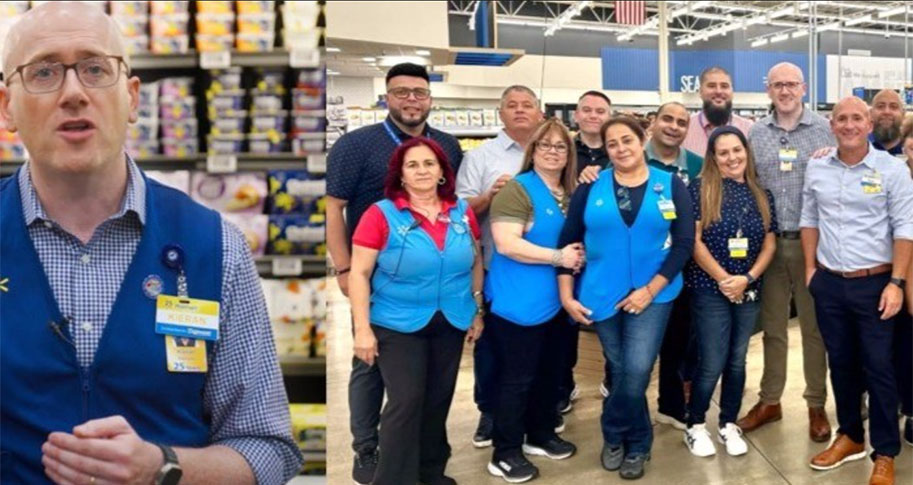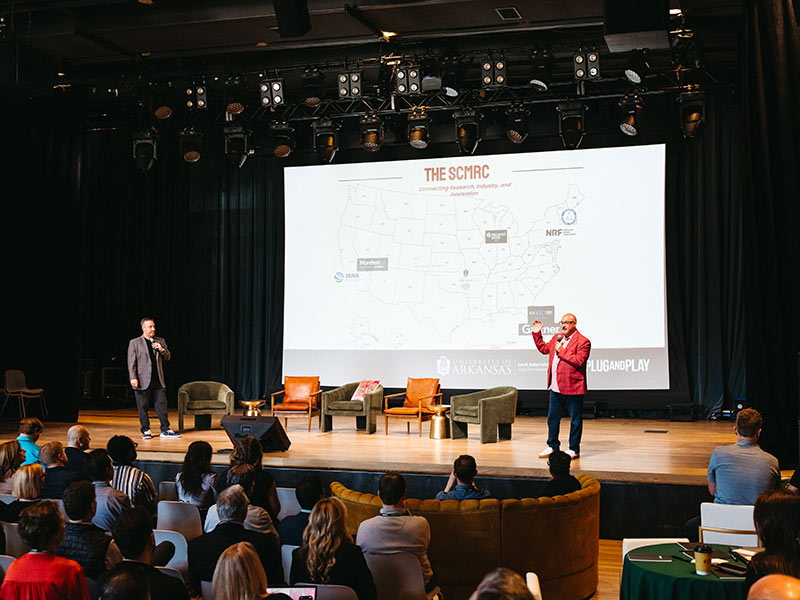
Matthew Waller, dean emeritus for the Sam M. Walton College of Business, and Adam Stoverink, executive director of the Walton MBA programs, are co-teaching Leadership & Organizational Behavior this fall to Walton full-time MBA and Walton Executive MBA students. The class explores Walmart as a semester-long case study, bringing leadership theories and principles to life through compelling examples and executive guest speakers.
This past week, our EMBA Leadership & Organizational Behavior class had the privilege of hearing from Kieran Shanahan, EVP & Chief Operating Officer of Walmart U.S. His session on ethical leadership was both practical and inspiring, grounding complex frameworks in real-world leadership challenges.
What struck me most was how consistently Kieran’s philosophy of leadership shows up in what he says, in what he does, and in how he communicates on platforms like LinkedIn.
Ethical Leadership in the Classroom
In our discussion, we explored the idea that ethical leadership is built on a foundation of values, character, and consistency. Leaders influence not only through formal authority but through their ability to model integrity, fairness, and genuine care for others. Ethical dilemmas are rarely about simple choices between right and wrong; they are often “right versus right” decisions, requiring judgment that blends rules, outcomes, and virtues.
Kieran reminded us that ethical leadership is about alignment and ensuring that the decisions leaders make are consistent with their values and the organization’s purpose.
Leading with Humility and Presence
One of the most memorable lessons from Kieran’s visit to our class was not something he said, but something he wore. He walked into the room in a Walmart associate vest with his name tag. The tag listed his name and the fact that he has been with the company for more than 25 years. Nowhere did it say “EVP” or “Chief Operating Officer.” On the back, the vest simply read, “Happy to help you?”
When I asked him why he wears the vest, his answer was revealing. He explained that when he enters a store dressed like this, customers don’t know he’s the COO. That anonymity allows him to experience the store environment as others do: how associates are treated, and how processes actually work in real time.
He doesn’t just observe. He works side by side with associates: on the returns desk, as a cashier, unloading trucks. In one example, he noticed a delay in the technology at the returns desk that frustrated customers when lines grew long. Experiencing this firsthand gave him insights he couldn’t have gained from reports or dashboards.
This practice also helps him build trust with associates. They open up to him more easily when he shows up as one of them, not just as an executive. And it reinforces his commitment to safety, which he consistently identifies as a top priority.
What stands out is that even while carrying the enormous responsibilities of a COO, he deliberately makes time each week to be present in stores, DCs, fulfillment centers, etc. This balance between strategic leadership and hands-on presence demonstrates a key principle of ethical leadership: humility. By stepping into the shoes of associates, he grounds his decisions in lived reality rather than abstract strategy.
Ethical Leadership in Practice
When you read through Kieran’s recent LinkedIn posts, the same principles come through clearly:
- Recognition and Respect for People
Kieran frequently highlights associates like Dewayne Magee and Frederick Wilson, drivers with decades of service, or Laura Amaya, celebrating 40 years with Walmart. His consistent emphasis on gratitude shows how recognition reinforces dignity and respect, central to ethical leadership. - Commitment to Community
In posts reflecting on Walmart’s response to crises (such as the teams who came together after natural disasters) he underscores the ethical responsibility of business to serve communities, not just customers. This reflects a broader view of leadership. - Celebrating Integrity and Growth
Whether congratulating Daniel Harrelson on his promotion or recognizing associates who embody Walmart’s purpose, Kieran highlights leadership transitions as team achievements. Ethical leadership is, in part, about giving credit outward and lifting others up. - Authenticity in Everyday Engagement
His repeated phrase “Our people make the difference. Let’s go.” It reflects a belief in the intrinsic value of people, aligning with what we discussed in class.
Ethical Leadership as a Defining Moment
Joseph Badaracco, in his classic article The Discipline of Building Character, describes how leaders are often tested in defining moments. These are the times when the choice is not between right and wrong, but between two competing “rights.” These moments, he argues, shape character because they force leaders to live out their values rather than merely talk about them.
Kieran Shanahan approach to leadership offers a vivid example of this. He makes the deliberate choice to spend time in stores, DCs, etc., wearing a vest, working the returns desk, unloading trucks, and standing shoulder to shoulder with associates.
Badaracco also notes that executives face the question, “Who is the company?” Their actions ultimately define what the organization stands for in society. Kieran’s consistent message, “Our people make the difference,” reflects his answer to that question. By choosing humility and presence, he underscores that ethical leadership is not only about decisions made in the executive suite, but about the daily practice of living values in action.
What we saw in class was a leader articulating frameworks for ethical decision-making. What we see online is the lived example of those frameworks.
References
Badaracco, J. L., Jr. (1998). The discipline of building character. Harvard Business Review, 76(2), 114–124.
Collins, J. (2001). Level 5 leadership: The triumph of humility and fierce resolve. Harvard Business Review, 79(1), 66–76.
French, J. R. P., Jr., & Raven, B. (1959). The bases of social power. In D. Cartwright (Ed.), Studies in social power (pp. 150–167). Ann Arbor, MI: Institute for Social Research.
Kidder, R. M. (1995). How good people make tough choices: Resolving the dilemmas of ethical living. New York, NY: HarperCollins.




